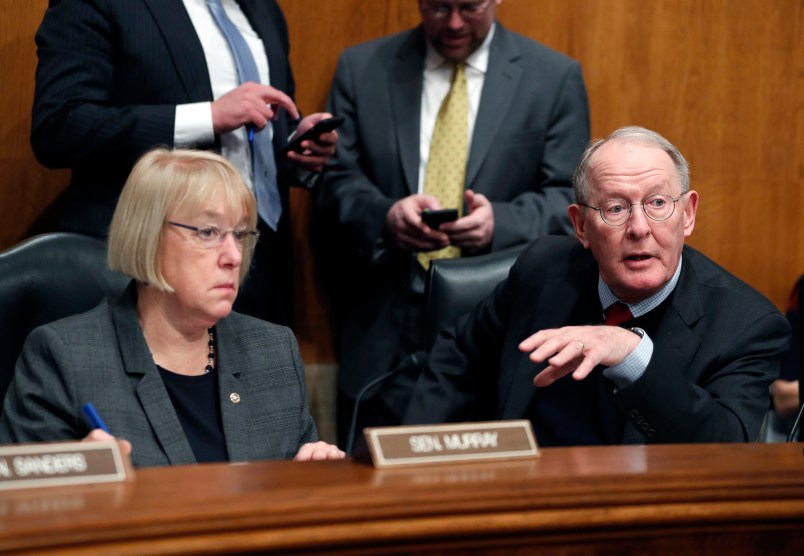After blowing past a self-imposed September deadline for passing a bill to stabilize the Affordable Care Act’s volatile individual market and prevent massive rate hikes from hitting people across the country, the negotiations around that bill are on life support, languishing without the backing of Republican leaders.
“We don’t have an agreement yet,” Sen. Lamar Alexander (R-TN), the chair of the Health, Education, Labor and Pensions Committee told reporters Tuesday. “We’ll keep talking.”
Asked if Senate Republican leadership is encouraging him to continue the negotiations, Alexander laughed. “I’m telling them that I am continuing the talks,” he quipped. “My hope would be that they would want to put it on the floor.”
This week, health insurance plans across the country submitted their final rates for 2018, many requesting massive double-digit rate hikes and explicitly citing uncertainty around Congress and the president’s plans for the individual market.
Rates in Florida are projected to jump 45 percent next year, while premiums in Utah are could increase by nearly 40 percent. While the majority of people in the individual market receive Obamacare tax credits and are largely cushioned from the rate hikes, not everyone receives those subsidies. The federal government also stands to pay much more in tax credits if rates go up.
In Alexander’s home state of Tennessee, the insurer Cigna is hiking premiums by 36.5 percent, and BlueCross BlueShield of Tennessee by 21 percent, “most of which is attributed to federal uncertainty,” according to The Tennesseean.
Some companies, citing the same uncertainty, exited certain state markets altogether, leaving patients there with just a couple of choices of plans.
In particular, the insurance companies say they’re in the dark as to whether President Trump will make good on his repeated threat to cut off billions in subsidy payments to insurance companies that help cover the cost of covering low-income patients with severe health needs. Alexander’s negotiations with Sen. Patty Murray (D-WA), which fell apart when Congress decided to make a last-ditch attempt to repeal Obamacare altogether, centered on taking this power out of Trump’s hands and stabilizing the market by guaranteeing the subsidy payments for two years. After the repeal effort failed, the Alexander-Murray negotiations resumed, but Alexander suggested that progress is proving elusive.
“We’re trying to find not just an agreement between the two of us, because that won’t do anything,” he said. “We’re trying to find a significant number of Republicans and Democrats who can agree on a limited, bipartisan plan to stabilize the market in 2018 and 2019.”
Republican lawmakers told TPM that the issue did not even come up during a lunch meeting on Tuesday, and Sen. John Thune (R-SD), a member of the GOP leadership team, was noncommittal when he emerged.
“The question is whether, when they present their ideas, there will be sufficient support to move forward with something,” Thune told reporters. “I don’t know the answer to that at this point.”
But rank-and-file lawmakers on both sides of the aisle, pointing to the premium hikes happening across the country, stressed the need for urgent action.
“It’s absolutely essential that we do a stabilization bill in order to help provide more choices to consumers and lower premiums,” Sen. Susan Collins (R-ME) told TPM.
“We had hoped we’d be able to find some kind of consensus that would allow the states to be innovative and bring back the CSR [subsidies],” lamented Sen. Mike Rounds (R-SD). “Unfortunately, at this point, we don’t have it. Without it, there will be chaos in the market.”
“We’ve got a very serious problem in the individual market,” a grave Sen. Bernie Sanders (I-VT) told TPM. “Rates are going up. It’s something that should be dealt with and these guys are working on it. I hope they succeed.”







So the hand grenades tossed into health care by Republicans appear to be having their intended effect.
From the party that has said “Government is the problem” doing their best to make it true.
I hope they succeed. I’m an upper middle class individual who buys her health insurance on the federal exchange and is two years away from Medicare.
We’re holding sick children hostage, so do what we want.
“Death panel” - see Republican Congress